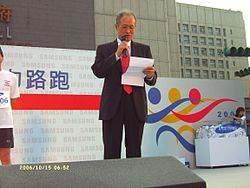Koreans in Taiwan
 Representative of the Korean Mission in Taipei Oh Sangsik at the 2006 Samsung Running Festival Taipei. | |
| Total population | |
|---|---|
| 3,968 (2011, MOFAT)[1] 3,574 (2012, NIA)[2] | |
| Regions with significant populations | |
| Taipei, Kaohsiung | |
| Languages | |
| Korean, Chinese | |
| Related ethnic groups | |
| Koreans |
Koreans in Taiwan are the 30th-largest population of overseas Koreans and the 9th-largest foreign community in Taiwan.[1][2]
History
Though a few Korean fishermen lost at sea during the Joseon Dynasty settled in Taiwan, they never formed a significant population. Taiwan was under Japanese rule since 1895. Even with the 1910 onset of Japanese rule in Korea, Korean migration to Taiwan was minimal; it was only in the aftermath of the March 1st Movement and the associated economic difficulties it caused that Korean migration to Taiwan became a mass phenomenon. Most settled in Keelung and other port cities, where they made a living by fishing.[3] During World War II, some Koreans were also conscripted into labour service and brought to Taiwan.[4] After Japan's defeat in the war ended Japanese rule in Taiwan, an estimated 1,300 Korean soldiers serving with the Imperial Japanese Army and 2,000 civilians organised their own repatriation to the Korean peninsula, and by 1946, only 400-500 Koreans were recorded as living in Taiwan.[5]
The incoming Kuomintang government established comparatively rigid requirements for residence in Taiwan, and so the only Koreans who were able to obtain residence cards were officials and those with skills that would be useful in the postwar reconstruction, such as engineers. Those who remained founded the Korea Association in Taiwan in 1947.[6][7] Due to the government's policy of discrimination in favour of native fishermen, most Koreans were forced out of the fishing industry, and into agriculture and commerce; they slowly moved away from Keelung, towards other major urban areas such as Taipei and Kaohsiung.[3]
Education
Taiwan's first school for South Korean nationals, the Kaohsiung Korean School, was founded on 25 January 1961, while the Taipei Korean School was founded a year later, on 1 February 1962. As of 2007, the schools enrolled 22 and 50 students, respectively.[8][9]
Demography
In 2011, statistics of South Korea's Ministry of Foreign Affairs and Trade showed 3,968 South Korean nationals or former nationals living in Taiwan. This represented an increase of 26% over the 2009 figure of 3,158 (2009).[1][10] 420 had Republic of China nationality, 283 were permanent residents, 686 were international students, and the remaining 2,579 had other kinds of visas.[1] June 2012 statistics of National Immigration Agency (which do not count naturalised citizens formerly holding South Korean nationality) stated that there were 3,574; among them, 1,494 had work authorisation (332 businesspeople, 96 engineers, 47 lecturers, 169 missionaries, 58 unemployed, and 792 authorised for other kinds of work), while the remainder did not (647 homemakers, 774 students, 652 children under the age of 15, and 7 in other categories).[2]
Notable people
- Lee Hyeong-Suk, former South Korean Olympic women's basketball team member, now a coach at Pu-Men High School[11]
- Yoo Ha-na, television actress[12]
See also
- Chinese people in Korea, many of whom held Republic of China citizenship and came to Taiwan for further studies
- Republic of China–South Korea relations
References
- ^ a b c d [[:Template:Asiantitle]], Ministry of Foreign Affairs and Trade, 2011-07-15, p. 64, retrieved 2012-02-25
{{citation}}: URL–wikilink conflict (help) - ^ a b c "外僑居留人數統計". Taipei: National Immigration Agency. 2012-06-25. Retrieved 2012-07-06.
- ^ a b Kim, Seung-il (2004). "臺灣 韓僑의 역사적 遷移 상황과 귀환문제 (Expatriate Koreans in Taiwan and Issues and related to Returning to Korea)". Template:Asiantitle (28): 283–311.
{{cite journal}}: Unknown parameter|month=ignored (help) - ^ Hwang, Sun-ik (2005). "일제강점기 대만지역 한인사회와 강제연행 (Korean Community and Compulsory Seizure during Japanese Forced Occupation in Taiwan)". Template:Asiantitle (24): 393–398.
{{cite journal}}: Unknown parameter|month=ignored (help) - ^ Hwang, Sun-ik (2005). "해방 후 대만지역 한인사회와 귀환 (A study on the Korean Society and Korean Repatriation in Taiwan after the Liberation)". Template:Asiantitle (34): 195–220.
{{cite journal}}: Unknown parameter|month=ignored (help) - ^ Hwang, Sun-ik (2006). "해방 후 대만한교협회 설립과 한인의 미귀환 (Foundation of The Korea Association in Taiwan and In-repatriation of Korean after the Liberation". Template:Asiantitle (38): 135–159.
{{cite journal}}: Unknown parameter|month=ignored (help) - ^ Korea Association in Taiwan - Hangul: 대만한교협회; Hanja: 臺灣韓僑協會; RR: Daeman Han'gyo Hyeophoe
- ^ "Overseas Korean Educational Institutions: 고웅한국학교". National Institute for International Education Development, Republic of Korea. 2007. Archived from the original on 2007-09-30. Retrieved 2007-05-15.
- ^ "Overseas Korean Educational Institutions: 타이빼이한국학". National Institute for International Education Development, Republic of Korea. 2007. Archived from the original on 2007-09-30. Retrieved 2007-05-15.
- ^ "재외동포현황/Current Status of Overseas Compatriots" (Document). Ministry of Foreign Affairs and Trade. 2009.
{{cite document}}: Unknown parameter|accessdate=ignored (help); Unknown parameter|publication-place=ignored (help); Unknown parameter|url=ignored (help) - ^ "李亨淑開轟 42歲老將飆27分", Apple Daily, 2006-02-22, retrieved 2012-07-06
- ^ "유하나 "'조강지처클럽' 만난 것은 행운"". Yonhap News. 2008-09-13. Retrieved 2012-07-06.

